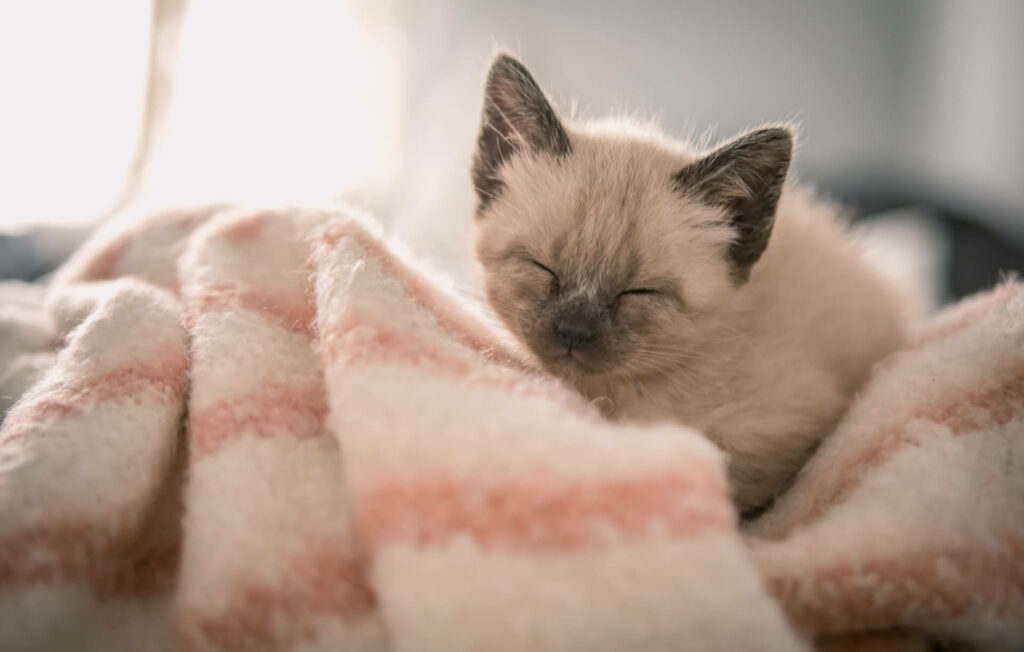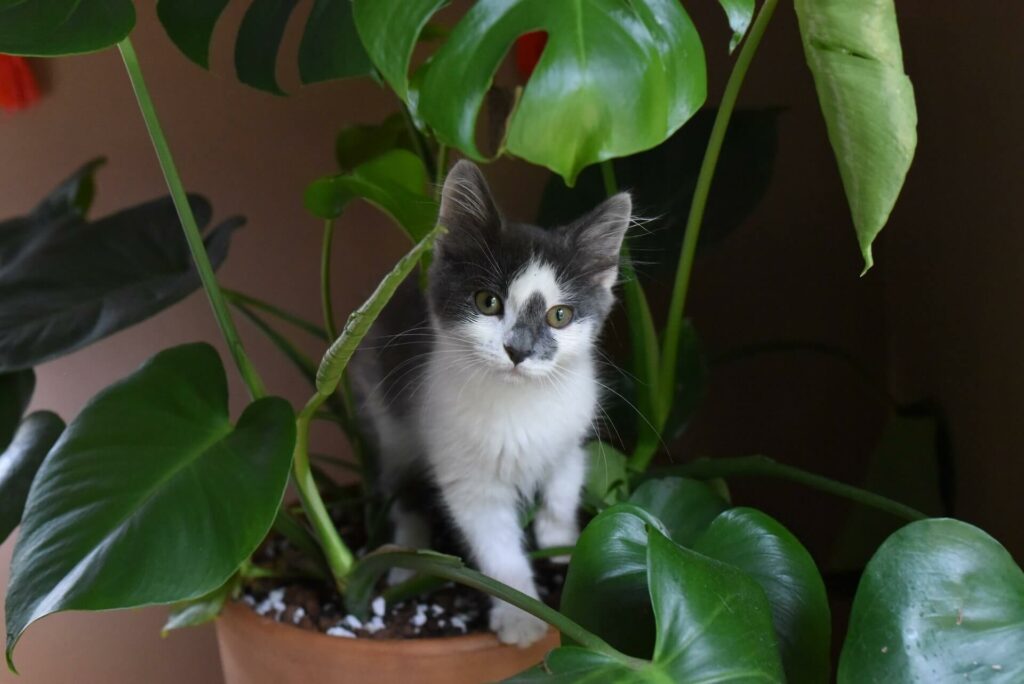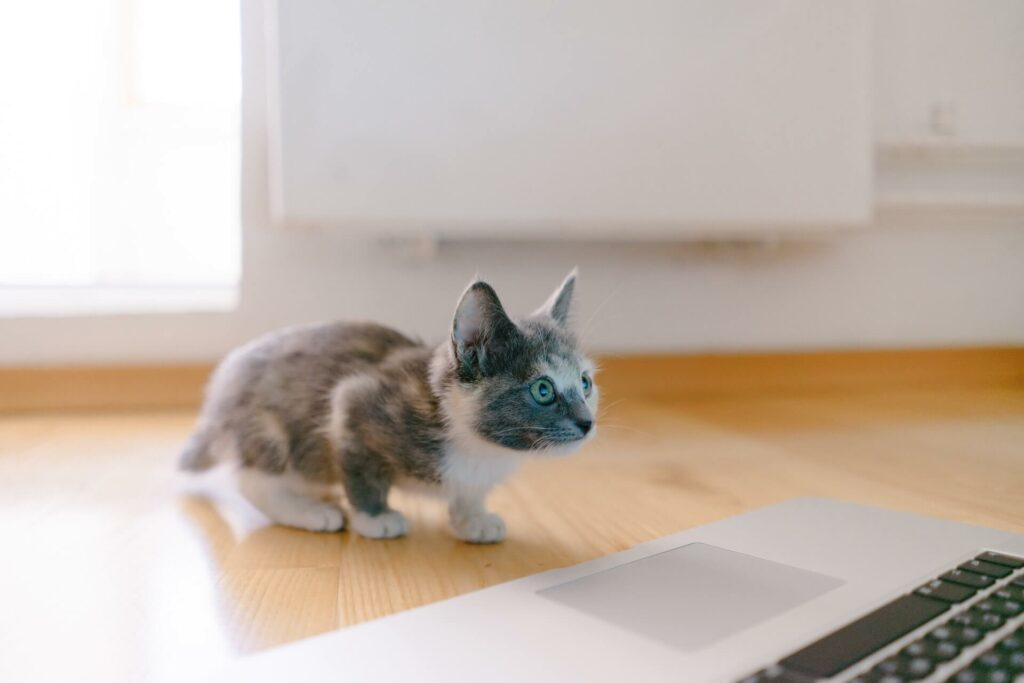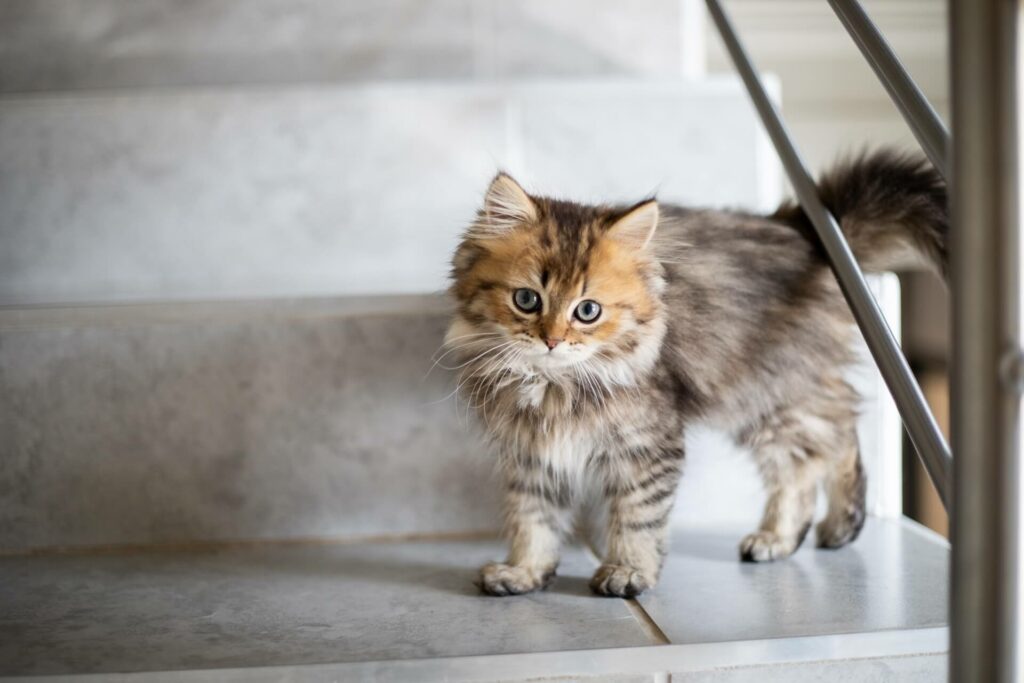Kittens: They’re irresistibly cute! They’re always there for you to boop their small noses or keep you warm when you’re sleeping.
But adding a kitten to your household can be a lot more complicated (and labor-intensive) than adopting an adult cat. You’ll have to guide your tiny fur ball on how to use the litter box properly (and clean up the resulting messes), not to mention get them vaccinated, and make sure they have the proper nutrition and care.
If you know what to expect when raising a kitten, you’ll be set up for success.

Important info before adopting
How old does a kitten have to be before they can leave their mom and join your home? This transition generally shouldn’t happen before 8 weeks of age, around the time kittens stop nursing. We know, you’re going to be an amazing pet parent—but these first weeks are a crucial developmental period in the mother-kitten relationship.
Also, if you’ve decided to adopt one kitten… it might be a better idea to get two from the get-go. It’s easiest for cats to learn healthy socialization skills from other cats. And this will prevent your cat from feeling lonely when you’re not around.
What if the kitten’s mother is nowhere to be found, and you’ve taken on the responsibility of fostering a newborn feline? That’s manageable, but it requires a lot of effort and TLC.
Taking care of newborn kittens that have been prematurely separated from their mom means that you’ll have to take on bottle feeding. You’ll also need to help them go to the bathroom, and groom them.
Like human babies, they need frequent feedings, so be prepared for a strict feeding schedule, around the clock–yup, this means waking up multiple times at night! Once the kitten is between 5 and 6 weeks old it can start weaning onto wet food instead of kitten formula.
How to prepare the home
Okay, so you’re doing this. You’re getting a kitten. How can you kitten-proof your home in preparation?
That old saying about cats and curiosity is spot-on, and your rambunctious new pet will probably try to get into all sorts of trouble. By thinking ahead and taking steps to keep your place safe, you’ll cut down on accidents.
Here’s what to keep in mind.
- Get rid of poisonous plants. Cats love to chew on houseplants, so make sure the plants in your house are safe for them to munch. Eating lilies, dieffenbachias, foxglove, philodendron, azalea, or rhododendron can be fatal to cats.

- Hide electrical cords. Unplug and put away electrical cords when you aren’t using them. Cats can chew through or get tangled in the cords, so keep them secured and out of your cat’s reach.
- Secure windows and screens. Before you take your cat home, make sure you have screens on all windows. This way, your cat can enjoy some fresh air without taking an unexpected tumble.
- Buy scratching toys. Your cat will scratch in order to stretch, mark their territory, and shed their outer claws. Keep your cats from scratching up your furniture by purchasing a scratching post or scratching boards so they have something fun (and less expensive) to sink their claws into. If you want to protect your furniture before your kitten is properly trained you can buy a couch cover or adhesive cat-scratch shields.
- Keep breakables safe. Priceless crystal vase? Hand-blown glass figurines? A full set of wine glasses? Cats are known to climb and knock things over, especially if those things will shatter into a million pieces. Keep breakables out of your cat’s reach so you can avoid an accident. It also might be smart to buy a cat tree so there’s a safe place for your kitty to climb without wreaking havoc.
- Invest in a good vacuum. Trust us. There’ll be a lot of cat hair. In addition to a heavy-duty vacuum, a grooming tool like the Furminator might just change your life.
Buying the essentials
Most cats enjoy the simple luxuries. They’ll choose a cardboard box over a $100 cat bed and would rather play with a bottle cap than their fancy robot-fish toy.
Cats are fickle and hard to please—that’s part of the reason we love them!—but here are some essentials that you’ll want to have on hand before your kitten(s) arrive.
Toys
Kittens love to play and we love watching them play. Simple toys like fake mice, a string with a feather attached to the end, or a ball with a bell inside will do the job and usually won’t cost you more than a couple of bucks. But you don’t need to buy anything if you don’t want to. An empty toilet paper roll, a Q-tip, an old sock with some paper in it, or a handmade pom-pom will keep your kitten entertained all day!
Cat television also does the trick when you run out of entertainment options…

Litter box
Our favorite vet, Dr. Liff, recommends getting one litter box per cat… plus an extra. This means that if you only have one kitten, you should get two boxes. And if you get two kittens, you’d get 3 litter boxes. We know that this sounds like a lot—especially if you live in a small city apartment—but cats are territorial and clean animals who appreciate their own toilet with their own scents.
Bowls
When you’re buying food and water bowls there isn’t much that can go wrong. Just make sure you don’t buy anything made out of plastic because it can absorb odors in a way that your kitten won’t like. Instead, look for bowls made out of ceramic, stainless steel, or melamine.
Ensuring that your kitten drinks enough water can be tricky. Some cats don’t like drinking still water and prefer moving water. Their instincts tell them that standing water is less safe to drink than running water—which, in nature, is true! But your third-floor walk-up is not the savanna. An easy solution to provide your kitty with fresh water is to buy them a water fountain. Many water fountains even filter the water, which is healthier.
Kitten food
A kitten doesn’t eat the same amount and type of food as an adult cat. They play a lot while growing and developing and need to refuel their little bodies about 3 to 4 times a day. They also need specific nutrients like fatty acids, protein, amino acids, and minerals. This specific balance of nutrients helps them grow.
Dr. Liff recommends giving the food that’s formulated specifically for kittens until they’re 10 to 12 months of age. Investing in high-quality cat food is important in order to avoid dental problems and other health issues.
Bed
There’s a good chance that your kitten won’t sleep in their super fluffy, super expensive bed. You can take the chance and buy one, or you can just gift your little angel a cardboard box (nicely painted and decorated by hand, of course). Or just get used to your kitten snoozing on your couch, kitchen table, bathtub, keyboard, and laundry pile. Your new friend probably won’t be too picky about where they catch their zzzs.
Carrier
You’ll need to visit the vet regularly, and will want to invest in a good carrier that is both safe and comfortable. The most important thing about a carrier is that it closes securely. Fun fact: Some cats learn how to open zippers. Read carrier reviews before you pick one, and go for a locking system your curious kitten won’t be able to open.
Also keep in mind the carrier’s material. It’s not uncommon for anxious kitties to have an ‘accident’ in transit. Hey, it happens to the best of us! A carrier made out of fabric might be harder to clean, so it’s something to keep in mind before purchasing.
If you have two kittens, get two carriers. Your cats might be tiny, but that doesn’t mean they want to share a cramped space (traveling is stressful enough as it is). The good news is that there are plenty of carriers that fold up when they’re not in use, so they won’t monopolize your closet.
Spa day for the kitten
To make sure your kitty looks snatched (and also to avoid knots, hairballs, and sharp nails), you’ll have to groom them and cut their nails. The earlier you start, the easier it will be to get them used to it.

Kittens do groom themselves, but if you help them it will prevent them from licking up a lot of their own hair, which turns into a hairball (which no one is a fan of).
Cats need their nails for stretching, scratching, balance, self-defense, and much more. So it should go without saying that you should never mutilate a cat by declawing them. It might make your life easier, but it’s bad news for your furry friend. End of story.
But you can definitely clip their nails to avoid painful play sessions or unwanted scratching. Use a nail clipper that is made for cats and only clip the part of the nail that is white. If you are unsure of how much you can clip, just cut the tip and take it slow.
End the grooming and clipping session with some playtime or a snack, so that your kitten will have positive associations with the routine.
Keeping your kitten safe and healthy
You are responsible for this little bundle of joy, so you’ll want to keep her in the best possible shape.
First, you’ll want to find a good vet. Your new cat might seem perfectly fine, but you don’t want to avoid a doctor’s visit until a health condition arises. Kittens need regular check-ups and vaccinations (learn more about those kitten vaccinations).
Unfortunately, kittens can get diseases from their mother, like feline leukemia, FIV, and a number of parasitic infections, so your vet will check for these. Not all parasites show up on fecal tests (and some of them can be passed on to humans), so your vet may administer a deworming medication every visit.
What should you expect at the initial vet visit? There will be a physical examination done of the kitten to make sure everything’s in good working order. In addition to checking the mouth, lungs, heart, and eyes, the vet will also check for ear mites and fleas (both a common nuisance).
You’ll also want to make an appointment to spay or neuter your kitten. Most vets recommend spaying or neutering around 5 to 6 months of age. These procedures can be expensive, but they’re an effective tool against both feline overpopulation and a variety of health conditions.
Roving, free spay-and-neuter clinics are an option, but competition for these appointments can get fierce. Thankfully, Lemonade cat insurance has introduced a Kitten and Puppy Package that helps cover the cost of these vital procedures.
Should they stay or should they go (outside)?
Cats love to play and explore. And maybe you feel bad watching your kitty sitting in the window, gazing longingly at the outside world. But is it safe, and worth the risks, to let your cat venture outdoors?
Lastly, think about if you want your kitten to be an indoor or outdoor cat. It really depends on where you live. In a crowded city like New York, your indoor/outdoor cat runs the risk of being injured by a car; large populations of feral cats also leave them vulnerable to illness or fleas.
In the suburbs or a rural area, the scenario might be different. But there are still dangers out there: cat fights, ticks, inclement weather, toxic foods…
If you decide to keep your cat indoors, there are still some options you can try out. If you have a balcony, you can install a safety net and let your fur fam chill there without fear of falling or escaping. There are also cat patios (and fun-looking tent-and-tunnel set-ups) that will give your kitty a less risky taste of the great outdoors.
In any case, decide early on whether your cat will roam outdoors or not, and stick with that choice—otherwise it can get confusing for your kitty.
And if you decide to let your cat go outside, microchipping is a smart move. If your kitten gets lost and is found by a stranger or good samaritan, they can be taken to a vet or animal shelter, where they will be scanned for a microchip that contains your contact info.
Also be sure that your outdoor cat is up-to-date on vaccinations, as well as flea/tick and heartworm preventative measures. It’s also a good idea to have them receive annual FeLV and FIV tests.
Kittens and Lemonade Pet insurance
Bringing home a cat is an investment in your own happiness, while giving a tiny creature the opportunity to live a long and healthy life by your side. But there’s no doubt about it: Vet bills can be kind of overwhelming.
Lemonade Pet insurance has recently added a Puppy/Kitten Preventative package for fur babies under 2 years of age—read all about it here. This add-on coverage can help pay for things like spaying and neutering, microchipping, the first rounds of vaccinations and more. You can read about the details and benefits here.
And don’t forget, it’s a smart idea to get health insurance for your cat while they’re still young and healthy—that way your policy won’t exclude treatments for any pre-existing conditions they might be diagnosed with later in life.
If you’re ready to get your kitten covered, just click the button below!
A few quick words, because we <3 our lawyers: This post is general in nature, and any statement in it doesn’t alter the terms, conditions, exclusions, or limitations of policies issued by Lemonade, which differ according to your state of residence. You’re encouraged to discuss your specific circumstances with your own professional advisors. The purpose of this post is merely to provide you with info and insights you can use to make such discussions more productive! Naturally, all comments by, or references to, third parties represent their own views, and Lemonade assumes no responsibility for them. Coverage and discounts may not be available in all states.




